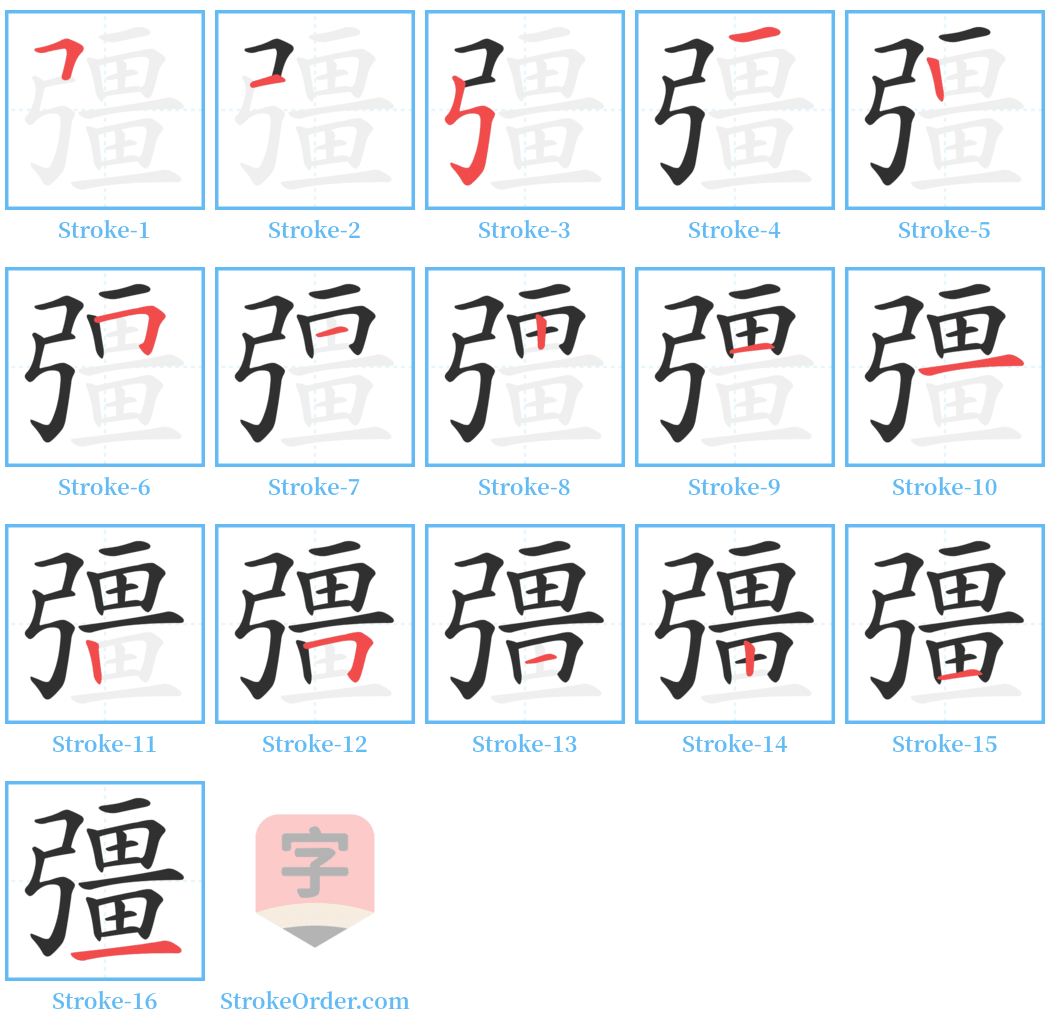彊 Stroke Order
Animated Stroke Order of 彊

Stroke Order Diagrams for 彊

Step-by-Step Handwriting Guide for 彊

Learn to Write Chinese Characters with Video Tutorials
Watch the video of writing the Chinese character "彊", learn the correct stroke order (笔顺) of the character "彊", and master the standard way of writing the character "彊".
Free Printable Handwriting Practice with Stroke Order: 彊
Printable Writing Practice Worksheet of "彊" in Portrait Orientation (Tian Zi Ge)

Printable Writing Practice Worksheet of "彊" in Landscape Orientation (Tian Zi Ge)

Information of 彊
Pinyin
qiáng、 qiǎng、 jiàng
Radical
弓
Strokes
16 strokes
Usage
★★★
Definition
variant of 強|强[jiang4] / variant of 強|强[qiang2] / variant of 強|强[qiang3]
彊 (qiáng)
1. Same as "强" (qiáng) - strong or powerful.
2. Adjective: Sturdy, grand, powerful. Example phrases: "强壮" (qiángzhuàng - robust), "身强力壮" (shēn qiáng lì zhuàng - strong and sturdy).
Example from Tang Dynasty: 柳宗元 (Liǔ Zōngyuán) in "愈膏肓疾赋": "外强中乾,精气内伤" ("Externally strong, internally dry, causing harm to the essence.")
3. Adjective: Resolute, tenacious. Example phrases: "顽强" (wánqiáng - unyielding).
Example from "孟子" (Mèngzǐ - Mencius): "乐正子强乎?" ("Is the music master strong?")
Example from "韩非子" (Hánfēizǐ): "能法之士,必强毅而劲直。" ("Those capable in the way must be resolute and upright.")
4. Verb: To force, to use strong measures. Example phrases: "勉强" (miǎnqiǎng - to force), "强迫" (qiǎngpò - to compel), "强人所难" (qiáng rén suǒ nán - to impose difficulties on others), "强词夺理" (qiáng cí duó lǐ - to distort the argument).
Example from "孟子": "是由恶醉而强酒。" ("This comes from the wicked drunkenness of strong wine.")
Example from "儒林外史" (Rúlín Wàishǐ): "这原是他情愿的事,又没有那个强他。" ("This was originally his willing matter, and no one forced him.")
5. Adverb: To exert oneself, to try hard. Example from "孟子": "君如彼何哉?强为善而已矣。" ("What of the lord like that? Just trying hard to do good.")
6. Adjective: Tough, unyielding. Example from "淮南子" (Huáinánzǐ): "木强而斧伐之。" ("The wood is tough and can be chopped.")
Example from "汉书" (Hànshū): "周昌,木强人也。" ("Zhou Chang, a man of strong wood.")
7. Adjective: Rigid. Example from "儒林外史": "一连吃了四五剂,口不歪了,只是舌根还有些强。" ("After taking four or five doses in a row, his mouth didn't twist, but the root of his tongue was still somewhat stiff.")